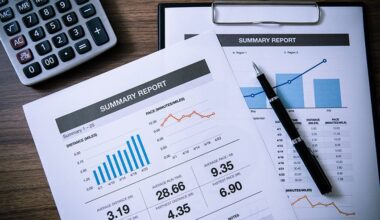The systematic collection, examination, interpretation, and presentation of financial data constitute business accounting. In small businesses, one individual may handle accounting; in large enterprises, various teams may handle accounting. However, a firm keeps track of its operations through accounting. Accountants review the financials of the company so the owner can make wiser choices. Reports containing this information are created to illustrate a company’s financial health. In this article, you will get to learn more about business accounting, which includes the best software for calculating it for both small and large businesses.
Business Accounting
The way by which firms understand their finances is called business accounting. SMEs cannot manage their cash flow, make wise financial decisions, or assure tax compliance without proper accounting. Companies can either manage their finances internally or hire an outside accountant to do so. Whether you decide to control your accounts or not, it is always worthwhile to become familiar with the basic accounting concepts to better comprehend your company’s finances.
The Basics of Business Accounting
The word “business accounting” is wide and encompasses a number of concepts and practices. Nevertheless, by understanding these accounting essentials, you’ll be better able to make business decisions and assure compliance when it comes time for your company to submit its tax return. Let’s look at it.
#1. Accounting for Accruals Vs. Cash
Different firm sizes and operating models can benefit from using either cash or accrual accounting. The main distinction is whether or not cash is recorded as an asset. The moment money is received, it is registered as an asset when using the cash method. The generated net earnings are then used to determine tax. The simplest type of accounting is utilized by tiny and micro businesses.
Revenue is thus, recognized using the accrual approach as soon as the business sends an invoice. Although the invoice amount is not now available to the corporation, it is nevertheless considered an asset. The same is true for expenses, which are recorded in the time that corresponds to the revenue they contributed rather than when money is spent.
#2. Assets, Liabilities, and Equity
Assets, liabilities, and equity make up the three fundamental accounting principles. The assets that make up your company’s finances include the debt you have to pay off (liabilities), the stock you and your investors possess (equity), and the things that give it its identity (its assets).
The following classifications are used to separate assets and liabilities:
- Current Asset: Assets that you will have for no more than a year, such as prepaid expenses, cash, accounts receivable, and stock or inventory, are known as current assets.
- Fixed Assets: These are assets that you will have for a long time, such as machinery, plant, or equipment.
- Current Liabilities: These debts and expenses, such as short-term loans, accounts payable, wages, etc., must be paid within the fiscal year.
- Long-Term Liabilities: They cannot be dissolved and will remain with the company for a period of more than a year (converted into cash). They could include automobiles that are financed or leased, equipment or plant, trademarks, patents, etc.
Why is Business Accounting Important?
Company accounting is crucial for making your company’s finances visible. It also aids companies in better understanding their assets, liabilities, and equity so they may make informed strategic decisions. When reporting your revenue and expenses to HMRC, business accounting is crucial for guaranteeing accuracy and compliance.
Business Accounting Degree
A profession in accounting, business, or finance can be prepared for by earning an accounting degree. To obtain a degree in accounting, students might opt to finish an associate, bachelor’s, or master’s program. A bachelor’s program must be completed in at least four years, while an associate program must be finished in at least two years. After earning a bachelor’s degree, professionals might choose to finish a second master’s program, which takes two years.
Students who enroll in an accounting degree program take a range of math and business courses, such as:
- Calculus
- Algebra
- Statistics
- corporate law
- Financial management
- Accounting tenets
- Budgeting
- Managerial Accounting
- Income taxation
- Auditing
- Analysis of statements
- Consulting
- Microeconomics
- Macroeconomics
What are the Advantages of an Accounting Degree?
The advantages of getting an accounting degree are numerous. Such typical advantages include:
- Specific arithmetic skills are taught to students as part of their accounting degree programs. They may be better suited for positions in accounting or other areas of finance as a result.
- There are more employment options because accountants are employed by several companies in numerous industries. Accounting graduates might have more accessible career opportunities.
- More earning potential: Accounting degrees can help professionals get promoted and earn more money.
- Career choices: Many students major in accounting in order to start professions in accounting or auditing, but graduates can have other opportunities. Many accounting graduates work as financial analysts, budget analysts, or in other finance-related positions.
Small Business Accounting
Accurate bookkeeping, which involves keeping well-organized records of a company’s financial operations, including sales, expenses, assets, and liabilities, is necessary for small business accounting. If you’re unfamiliar with the terms used in small business accounting, consult our useful glossary before continuing.
Balance sheets, income statements, and cash flow statements are the three types of accounting reports that bookkeepers typically work with. Each report contains distinct values and offers a different perspective on the financial health of a company. The variations between these reports are discussed in the section that follows.
#1. Balance Sheet
Balance sheets reveal the assets and liabilities of a business. A small business’s financial situation at a given period might be shown in this kind of statement. The assets and liabilities of the company are readily visible to bookkeepers. Balance sheets can be created by anyone at any time, although businesses normally do it at the conclusion of each quarter. A balance sheet is made up of assets, liabilities, and shareholders’ equity.
#2. Assets
Assets can lower costs and boost sales and have economic worth. They include things like real land, stock, money, and receivables. Also, assets are listed in balance sheets according to their liquidity, or how quickly they can be sold, used up, or converted into cash.
#3. Liabilities
A company’s liabilities are obligations it has to third parties. Liabilities include things like home loans, employee salaries, income taxes, and accounts payable.
The amount shareholders would earn if they sold all the company’s assets and paid off all its obligations is known as shareholders’ equity. Assets minus liabilities can also be used to understand the net worth.
How to Do Accounting for a Small Business
The financial management of a small business requires more than just bookkeeping. Employing expert accounting techniques enables you to effectively plan for the future of your business and satisfy regulatory requirements. Employing expert accounting techniques enables you to effectively plan for the future of your business and satisfy regulatory requirements. Successful small firms should now think about outsourcing their accounting requirements or purchasing accounting software. Each choice also has advantages and disadvantages, which are described in more depth below.
Choosing Your Accounting Solution
Your time might be freed up to concentrate on other business activities when you have a solid, effective accounting system. Consider the following inquiries when you look into accounting solutions for your business:
- What size is my business?
- Which accounting technology benefits my business the most?
- Is my knowledge of fundamental accounting sufficient for the job?
- Does my cash flow permit monthly or yearly accounting expenses?
- How at ease am I disclosing private company information to a person or accounting firm?
- Is it realistic for me or my staff to complete daily data entry?
- Does my business operate in a complicated tax environment that could be audited?
- Do my competitors in the industry find a certain approach to be particularly helpful?
- Are there any compatibility issues with other technical procedures that are used frequently, such as payroll?
You can choose the best course of action for your small business using the answers to the aforementioned questions as a guide. After that, you’ll be able to resume doing what you love while feeling secure about your financial future.
Best Software for Small Business Accounting
For a business to succeed, accounting software is a necessary component. Based on the scheme, it can assist you in producing expert invoices, keeping track of payments received and sent, identifying and pursuing past-due accounts receivable, streamlining tax management, and running reports that assess the financial health of your business and forecast for the future. We looked at some of the most well-liked platforms available right now in order to help you pick the finest accounting software for your company.
#1. QuickBooks Business Accounting Software
It offers four small business plan alternatives as well as a different choice for users who are self-employed. Both new and existing small businesses can benefit from the benefits that are offered by each. The platform is simple to set up and operate, so you can get your accounting software working entirely by yourself. But if you need more support, Intuit provides access to qualified bookkeepers who can assist you in setting up the program in a way that makes sense for your company. Moreover, QuickBooks Online enables you to design unique invoices and forms to ensure that your business’s branding is constantly prominent in customer correspondence. The pricing is a steal given the features and services you receive.
#2. FreshBooks Business Accounting Software
The program enables you to create professional-looking invoices that are consistent with your brand and track the progress of invoices so that you are aware of when consumers got their bills and when their outstanding balances are due. Also, it makes it possible for customers to pay you directly from their invoices online.
The FreshBooks dashboard is easy to use and comes with options for creating proposals that you can email to potential clients, time and expense monitoring, and project management features. You are organized and ready for tax season thanks to the double-entry accounting system. You can give other users access to certain features and grant permission to specific persons if you want accountants to have access to your dashboard, reports, invoices, and expenses. If you have workers, you can offer them access to your projects and let them keep track of their time and extra costs.
#3. Oracle NetSuite Accounting Software
Oracle NetSuite is the best option if your company needs to streamline accounts receivable and payable, quicken deal closings, and stay on top of increasingly complicated financial compliance requirements while utilizing a full range of effective business management tools. It also doesn’t restrict the number of users or depend on outside programs for customization. But, for small organizations that don’t require access to the sophisticated feature set it offers, it could be expensive and present a lengthy learning process.
The greatest option for moderate and expanding firms looking for cutting-edge features in accounting software is this one. Oracle NetSuite provides a user-friendly cloud-based financial planning solution that can monitor your financial information and automate a number of crucial accounting tasks as part of its comprehensive enterprise resource planning (ERP) offering.
#4. Zoho Business Accounting Software
Zoho Books can be scaled, too. You can take advantage of the alternatives that let you upgrade and interface with other business programs when your small business grows into a larger operation. It also comes with a mobile app so you can stay on top of accounting responsibilities while you’re out and about. The greatest accounting software is available for those with small enterprises. Some accounting software applications are not suitable for freelancers, contract workers, self-employed people, consultants, home-based business owners, those running e-commerce websites, or firms with fewer than 10 employees. The program could be too difficult, overly powerful, and unduly expensive.
#5. Xero Business Accounting Software
You can be certain that your income stream is positive with Xero so you won’t run out of money when it’s time to make payments. You can manage purchase orders, view current and future spending, and see when each payment is due on the user-friendly interface. Furthermore, you don’t need to download or install any apps because Xero is cloud-based. It provides an expert double-entry bookkeeping function, so both a debit and a credit will be recorded for each of your transactions. This program also saves you time because it automates a laborious process by allowing you to arrange forthcoming payments and batch-pay vendors in advance.
What are the Types of Business Accounting?
Cost, managerial, and financial accounting are the three categories of accounting.
Is Business Accounting Hard?
Although accounting does necessitate a complicated set of talents and abilities as well as good attention to detail, it actually isn’t that much more challenging than many of the other highly-liked academic disciplines that provide excellent chances for lifelong careers.
What are 7 Process of Accounting?
These are the seven steps in the accounting cycle:
- Analyzing and Recognizing Business Transactions
- Posting Transactions in Journals.
- Making adjustments to entries.
- Putting together the altered trial balance.
- Financial statement preparation.
- Trial balance after closing.
What are The 6 Basic Accounts in Business?
Types of accounts:
- Asset accounts
- Liability accounts
- Expense accounts
- Gain accounts
- Equity accounts
- Revenue accounts
Related Articles
- WHAT ARE ASSETS AND LIABILITIES: Definition, Differences and Examples
- Business Accounting Guide: (+ Free Samples & Courses)
- COST ACCOUNTING: Meaning, Importance, Types, and Guide
- Corporate Accounting: Job Description and Salary
- PRESENTATION IDEAS: Top 30 Ideas for Birthdays, Graduation & More
- EMAIL CAMPAIGNS: Meaning, Software & Marketing
- ADP RETIREMENT: Meaning, Service & Review
- WHAT IS SQUARE: Meaning, How It Works & Stock
- RELOCATION: Meaning, Package & Services
- WHAT IS THE ACCOUNTING EQUATION: Detailed Guide






